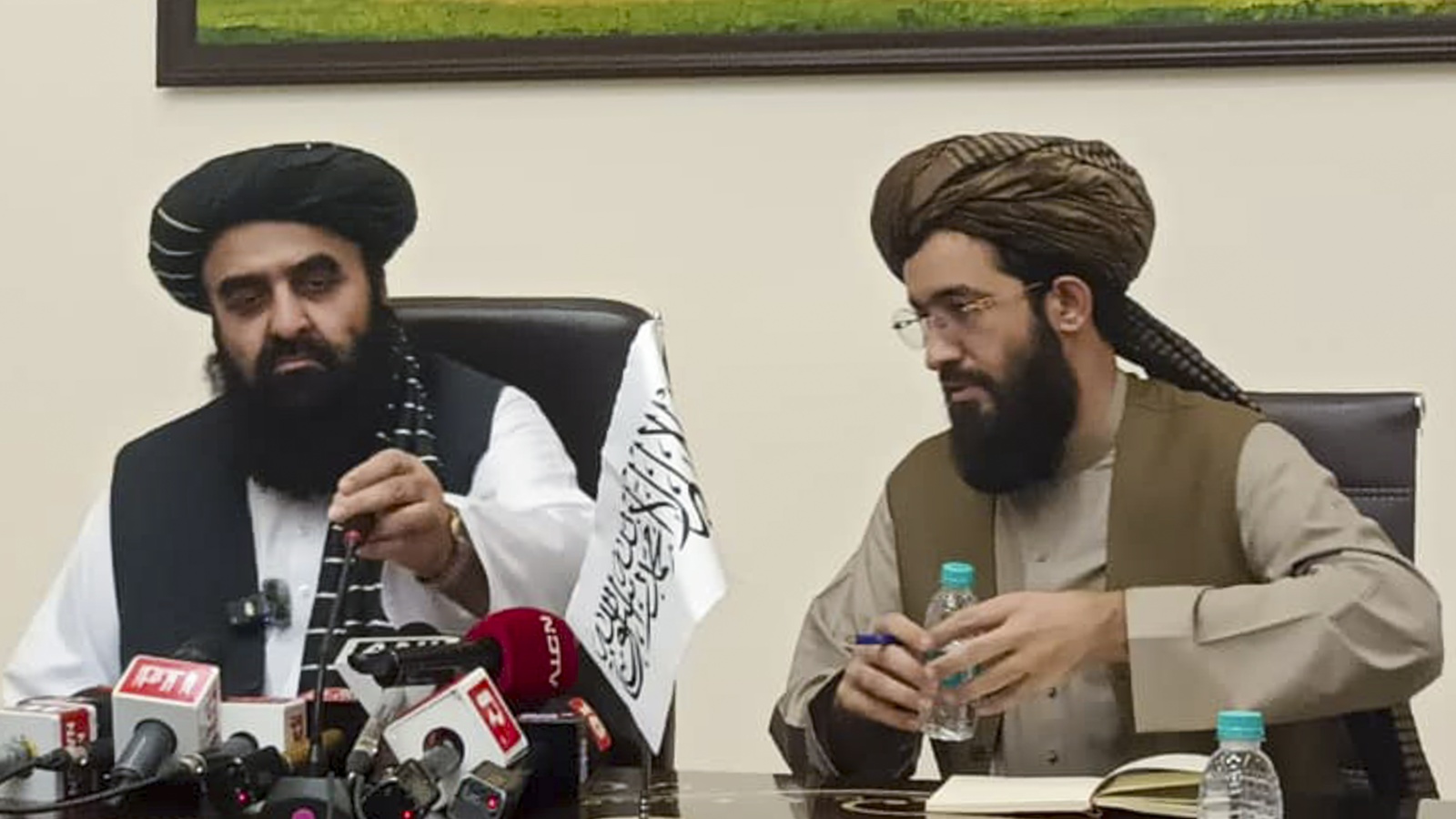
His remarks came a day after Pakistan summoned the Taliban ambassador to convey its “strong reservations” over the India-Afghanistan joint statement issued in New Delhi in which Kabul strongly condemned the terrorist attack in Pahalgam in April this year.
“We have good relations with the people of Pakistan and the government but some elements in that country are trying to create problems,” Muttaqi said.
“Pakistan ka awaam aur hukumat mein bhi aksar log aman-pasand hain (Pakistani public and most in the government are peace-loving people). They want good relations with Afghanistan. We have no issues with Pakistani people or political leadership. There is a specific section in Pakistan that is trying to exacerbate the situation,” he said, referring to elements in the Pakistan Army.
 Afghanistan’s Foreign Minister Amir Khan Muttaqi attends a press conference in New Delhi on October 12, 2025. (Reuters/Anushree Fadnavis)
Afghanistan’s Foreign Minister Amir Khan Muttaqi attends a press conference in New Delhi on October 12, 2025. (Reuters/Anushree Fadnavis)
“Afghanistan will protect its borders and its people, and we have retaliated to their actions. Qatar and Saudi (Arabia) have advocated that war should be stopped, so action has been halted from our side. The situation is under control now. We want good relations with everyone, we have brought peace to Afghanistan and want all matters to be solved through dialogue and discussions. If some people don’t want to take that path, Afghanistan holds the privilege to protect its borders and its people.”
Addressing a press conference which included women journalists, Muttaqi, who came under fire for excluding women journalists from his press conference Friday, claimed that not inviting women to the earlier press conference was not intentional but the result of a “technical issue”.
Story continues below this ad
On Sunday, Indian and foreign women journalists were among those allowed inside the Afghan embassy. About 100 journalists, almost half of them women, attended the press conference and asked tough questions on women’s rights in Afghanistan.
“With regards to the press conference (on Friday), it was on short notice and a shortlist of journalists was decided…The participation list that was presented was very specific. It was more a technical issue… Our colleagues had decided to send an invitation to a specific list of journalists and there was no other intention apart from this,” Muttaqi said, responding to a question on the discriminatory behaviour Friday.
Following the uproar, he cancelled his visit to Agra and addressed the media Sunday afternoon. It is learnt that the Indian government leaned on him to address the press conference at the Afghan embassy with a more inclusive gender approach, and sources said that he took approval from Kabul before agreeing to the media briefing.
 On Sunday, Indian and foreign women journalists were among those allowed inside the Afghan embassy. About 100 journalists, almost half of them women, attended the press conference and asked tough questions on women’s rights in Afghanistan. (Special Arrangement)
On Sunday, Indian and foreign women journalists were among those allowed inside the Afghan embassy. About 100 journalists, almost half of them women, attended the press conference and asked tough questions on women’s rights in Afghanistan. (Special Arrangement)
With the black-and-white Taliban flag forming the backdrop for the press conference at the embassy – the Afghanistan national flag fluttered outside – Muttaqi held forth on women’s rights.
Story continues below this ad
Asked about the gender discrimination in his country where girls are being denied education, Muttaqi claimed: “With regard to education, at the moment we have 10 million students attending schools and other educational institutes, of which 2.8 million are women and girls.”
“In religious seminaries, this educational opportunity is available all the way to the graduation level. There are certain limitations in specific parts, but that does not mean that we oppose education. We have not declared it religiously haram (forbidden), but it has been postponed,” he said.
On the issue of the safety of women in Afghanistan, he said: “Mard ho ya aurat, kisi ka haq zaya nahi ho sakta hai. Whether a man or a woman, if they are in trouble, they can approach authorities,” he said, adding “40 saal mei Afghanistan mei jo zulm aur zyadti hua hai (For the atrocities and excesses perpetrated over 40 years), from our (Taliban) side, over the last four years, we have pardoned everyone. And it is because of that Afghanistan today is largely peaceful. Anyone can come to Afghanistan and work under local laws.”
This flies in the face of facts which speak otherwise. Ever since August 2021, when the Taliban returned to power in Kabul, almost 100 edicts which restrict how women and girls move through society have been instituted and enforced. Over the last four years, Afghan women have been banned from pursuing higher education and working, not being allowed in public spaces like parks and gyms or travelling long distances without a male escort. Under the restrictions, women must not only be covered completely when in public but must not even be heard singing or reading aloud inside their homes.
Story continues below this ad
On the clashes and hostilities between Afghanistan and Pakistan, Muttaqi said: “Afghanistan will maintain the security of its territory and airspace. There have been violations and we have given immediate responses. In the night (Saturday), there were retaliatory operations in which we achieved our objectives,” he said.
He said Afghanistan has the capacity to defend its territory and airspace, adding Kabul wants to peacefully resolve all issues through dialogue and understanding.
“If some people don’t want to resolve this episode, Afghanistan has the capacity to protect its territory and airspace. The people and forces of Afghanistan are united to defend the country. Afghanistan has another great speciality that even if we have internal differences, when the issue of external interference comes up, then all the Afghan people, government and clerics get united to confront it and defend the country,” he said.
“Even in the future, our people and the government will unite and defend the country,” he said.
Story continues below this ad
“When someone tries to interfere in our internal matters, all civilians, government heads, ulemas and all religious leaders come together to fight in the interest of the country… Afghanistan has been under conflict for 40 years… It is finally free and is working for peace,” he said.
Pakistan has been accusing the Taliban regime of giving shelter to the Tehreek-i-Taliban Pakistan (TTP), blaming the group for a series of attacks inside the country.
Muttaqi rejected the charge: “There is no presence of TTP in Afghanistan now. Even prior to our return to Kabul, Pakistan military carried out operations in tribal areas where they displaced a large number of people. Even during that time, the US military and the US-supported former government gave refuge to them on Afghan soil. They are Pakistani people from displaced areas, allowed to live in the country as refugees. The Afghanistan-Pakistan border, the Durand Line, is more than 2,400 km. This hilly region could neither be controlled by Changez nor Angrez… neither by America nor NATO… it cannot be controlled by force.”
“If Pakistan wants peace – they have a bigger army and better intelligence – why are they not controlling it? Instead of blaming us, they should control the issues in their territory. Why is Pakistan not taking its people into confidence? Many people in Pakistan, and certainly we, do not want the fighting to continue. Pakistan should take control of these groups. We have controlled a country as big as Afghanistan after 40 years of conflict. Why is a section in Pakistan endangering its own people to please a few?” he said.
Story continues below this ad
“We have a policy of desiring good relations with all countries. There was fighting in Afghanistan for more than 40 years. The Soviet Union came and was defeated. The troops of more than 50 countries came with the US and NATO and there was fighting for 20 years and now Afghanistan is independent and standing on its own feet,” he said.
Muttaqi, who reached New Delhi on October 9, visited the Darul Uloom Deoband seminary Saturday. On Monday, he is likely to meet Afghan businessmen and members of the Afghan community in India.



 Afghanistan’s Foreign Minister Amir Khan Muttaqi attends a press conference in New Delhi on October 12, 2025. (Reuters/Anushree Fadnavis)
Afghanistan’s Foreign Minister Amir Khan Muttaqi attends a press conference in New Delhi on October 12, 2025. (Reuters/Anushree Fadnavis) On Sunday, Indian and foreign women journalists were among those allowed inside the Afghan embassy. About 100 journalists, almost half of them women, attended the press conference and asked tough questions on women’s rights in Afghanistan. (Special Arrangement)
On Sunday, Indian and foreign women journalists were among those allowed inside the Afghan embassy. About 100 journalists, almost half of them women, attended the press conference and asked tough questions on women’s rights in Afghanistan. (Special Arrangement)






